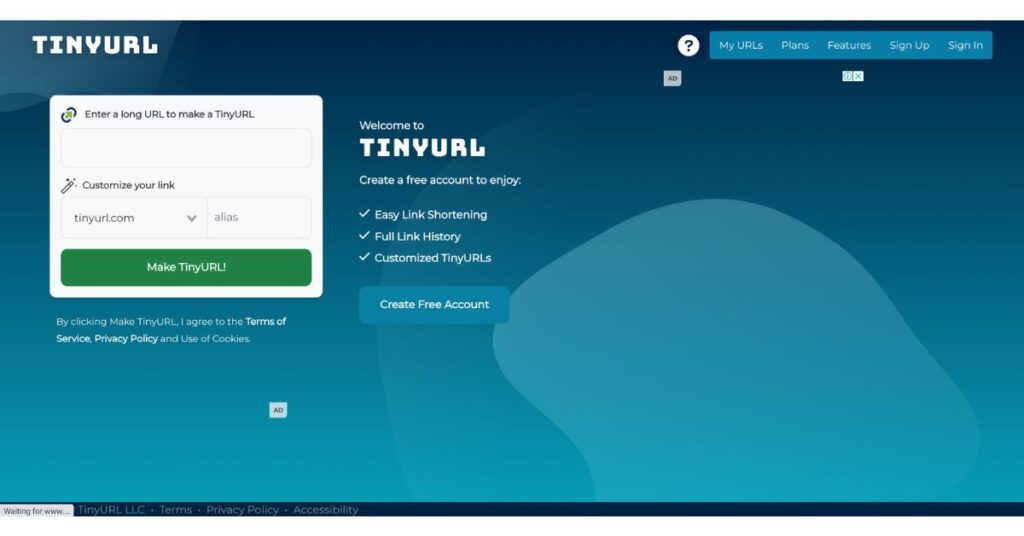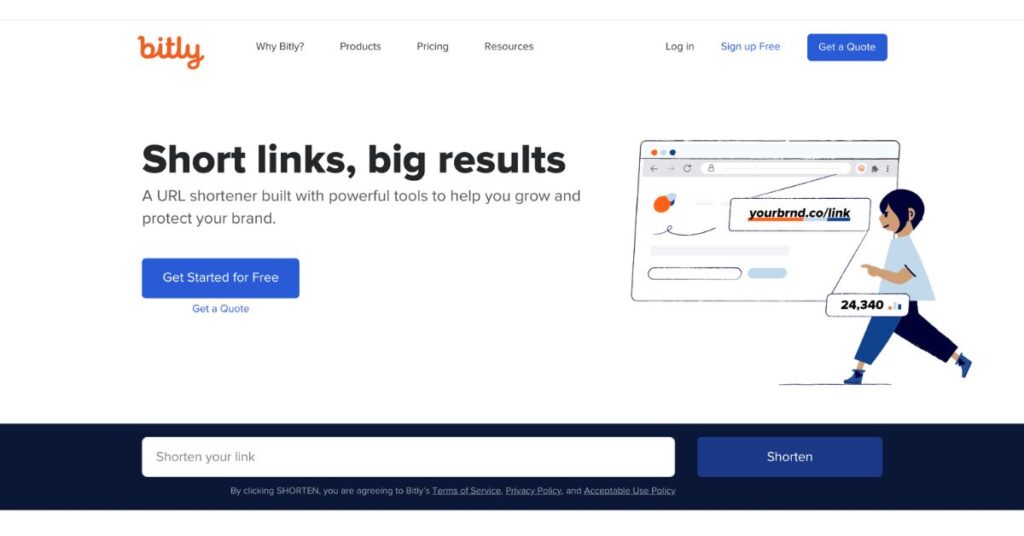TinyURL vs Bitly – There are several apps and tools out there that help content creators and marketers make quality content and that includes link shorteners.
We all know how link shorteners can be so useful. In this article, we’ll be comparing two such link shortening services – TinyURL and Bitly and weigh the pros and cons of each service and help you determine which tool is perfect for you.
So, without any delay, let’s get started with the Bitly vs TinyURL comparison!
TinyURL vs Bitly: Overview
Here is a short description of TinyURL and Bitly that help you understand what they are.
TinyURL

TinyURL is a URL shortening web service that offers short aliases for the redirection of URLs. It provides an API that let applications automatically create short URLs.
TinyURL homepage comprises a form that is used to submit a long URL for shortening. For every URL written, the server adds a new alias in its hashed record and produces a short URL.
These short URLs are useful as they are easy to remember, write down or distribute. Moreover, they also fit in text boxes with a limited number of characters permitted.
And if you want to view the full URL from the short TinyURL, you can visit TinyURL first and allow previews as a default browser cookie setting or copy and paste the short URL into the browser address bar.
Bitly

Bitly is another link shorter tool with a very diverse look and experience from TinyURL. It shortens over 600 million links per month to use in SMS, social networking, and email.
Once the shortcuts are created, they are supposed to be permanent and cannot be changed. The URLs that are shortened with this service use the bit.ly domain or other domain that the service offers.
It offers a paid service – Enterprise, which offers advanced branding features, omnichannel campaigns, audience intel, and many more. And it has advanced analytics features and uses Bitly data to give advanced social insight tools for companies and brands.
TinyURL vs Bitly: Key Features
Below are some features that Bitly and TinyURL offer
TinyURL
- Let you manage long URLs in your social media, email marketing, and other customer communications
- QR code for shorturl
- Shorten URLs with or without statistics
- Create branded and custom short URLs which your users or customers will trust
- Its analytics dashboard provides you with a broad array of information along with data points that show your marketing campaigns performances across regions, channels, and countries
- It uses is.gd API to shorten URLs and you can short almost any long URLs
- Have share and copy buttons for both long and short URLs
- It doesn’t short already shortened URL
- Custom URL support and no annoying ADs
Bitly
- Copy, customize, and share your links directly from your phone and view top-performing links
- Shorten and brank your links to improve clicks while upholding the tracking restrictions you want
- Design QR codes that match your brand using custom colors, logos, fonts, and incentive scans
- Choose from 16 different font types and font colors
- Easily connect your social networks for sharing through Bitly across SMS, social, display, and other channels
- Use QR codes to connect offline campaigns to interactive digital experience
- Create links that are more readable, trustworthy, and likely to be clicked
- Redirect links to different content if something changes or becomes outdated
TinyURL vs Bitly: Pricing
Keep on reading to find put about the detailed information on TinyURL and Bitly pricing
TinyURL
It offers three subscription plans, which are as follows:
- Free: It is entirely free. It is a free basic ad-supported shortening for individual users, which allows you to customize your links and keep track of your link history.
- Pro: Cost $9.99 a month or $119.88 annually. It takes your branded links to another level with limitless tracked clicks, URL editing, link tagging, and many more.
- Bulk 100K: Costs $99.99 a month or $1,188 annually. If you are someone who requires a huge number of shortened URLs for your SMS or other campaigns, TinyURL Bulk 100K can be a perfect choice.
| Plan | Free | Pro | Bulk 100K |
| API Limit | 600 | 10,000 | 100,000 |
| Free Branded Domain | No | Yes | Yes |
| History | No | 2 years | 2 years |
| Custom Alias | Yes | Yes | Yes |
| Shortened URLs | No | N/A | 300,000 |
| Active Tiny URLs | No | 500 | 100,000 |
| Tagging | No | Yes | Yes |
| Use Alternate Domains | Yes | Yes | Yes |
| Timechart | No | Yes | Yes |
Bitly
Bitly offers pricing for brands and businesses of all sizes. Here are the plans that Bitly offers:
| Plan | Features |
| Free | It is completely free50 bit.ly links per month Bitly-branded Link-in bio Custom back-halves Bitly-branded QR codes Link history and reporting |
| Starter | It costs $8 a month or $96 annually 200 bit.ly links per month Everything that the Free plan offers Link-in bio Link redirectsData exportAccess to support |
| Basic | It costs $29 a month or $348 annually 1,500 branded links per month Everything that the Starter plan has to offer Complimentary custom domain Custom link redirects QR codes Branded links |
| Premium | It costs $199 a month or $2,388 annually 3,000 branded links/month Everything that the Basic plan includes Advanced performance dashboard Campaigns QR code colors Location and device type |
| Enterprise | Custom 10,000 branded links per month Everything that the premium plan offers Multiple user seats and group permissions At scale link generation 99.9% SLA uptime Account manager support |
TinyURL vs Bitly: Pros-Cons
Here are the advantages and disadvantages of TinyURL and Bitly
TinyURL
Pros of using TinyURL:
- It is easy and free to use and doesn’t need you to sign up for an account to use it
- Simply copy and paste a long link into the link shortener box and tap on Make TinyURL
- Pricing is certainly eye-catching for most users and scales nicely as you grow
- Analytics tracking process is straightforward to use
- It offers browser extension and users can preview custom links and set up URL redirects
Cons of using TinyURL:
- Does not offer any kind of link management or analytics features
- Doesn’t provide the user with any performance data related to the links it creates
- Interface can use some improvements as it is outdated
- Some platforms don’t like the formatting of TinyURL’s link builder
Bitly
Pros of using Bitly:
- It is far more than just a link shortener as it let users and marketers the ability to create custom and encrypted short links
- Easy to set up because it only takes a few minutes to set up an account and start using
- Also features amazingly easy to use and intuitive features
- You can make most of the Bitly with Bitly 101 user guide, videos, resources, and other materials
Cons of using Bitly
- One of the main cons of Bitly is the price as it is a bit costly
- Only allows to create up to 1,000 short links per month
- Can’t edit links once created
- Doesn’t offer the ability to organize link folders
Bitly vs TinyURL: Which is Better?
TinyURL can be a perfect choice for those who simply wish to create a short link when needed and don’t really use them on a regular basis.
On the other hand, Bitly Bitly is the most popular link shortening service that is easy to use and helps content creators and marketers with numerous features.
Nonetheless, Bitly and TinyURL are fast, simple, and free to use. However, you can upgrade to the paid plan to access advanced features.
And the best URL shortening service depends on what you want and need to do. Thus, we hope the above article has helped you to understand everything about both the services.
FAQs
Is it good to use TinyURL?
TinyURL offers short aliases for the redirection of URLs, so it can be a perfect choice for those who wish to create a short link.
Is TinyURL a URL shortener service?
Yes. TinyURL is a URL shortening web service that provides short aliases for the redirection of URLs.
Is Bitly still free?
Yes, Bitly offers a free account option under the free plan, and you can upgrade to the paid plan to access advanced features.
AllmyLinks vs Linktree: Which Is Better For You? [2022]

![TinyURL vs Bitly: Which Is Better? [2024]](https://viraltalky.com/wp-content/uploads/2022/08/TinyURL-vs-Bitly.jpg)